
Paul Krugman joined The New York Times in 1999 as a columnist on the Op-Ed Page and continues as professor of Economics and International Affairs at Princeton University. Mr. Krugman received his B.A. from Yale University in 1974 and his Ph.D. from MIT in 1977. He has taught at Yale, MIT and Stanford. At MIT he became the Ford International Professor of Economics. Mr. Krugman is the author or editor of 20 books and more than 200 papers in professional journals and edited volumes. His professional reputation rests largely on work in international trade and finance; he is one of the founders of the "new trade theory," a major rethinking of the theory of international trade. In recognition of that work, in 1991 the American Economic Association awarded him its John Bates Clark medal, a prize given every two years to "that economist under forty who is adjudged to have made a significant contribution to economic knowledge." Mr. Krugman's current academic research is focused on economic and currency crises. At the same time, Mr. Krugman has written extensively for a broader public audience. Some of his recent articles on economic issues, originally published in Foreign Affairs, Harvard Business Review, Scientific American and other journals, are reprinted in Pop Internationalism and The Accidental Theorist. On October 13, 2008, it was announced that Mr. Krugman would receive the Nobel Prize in Economics.